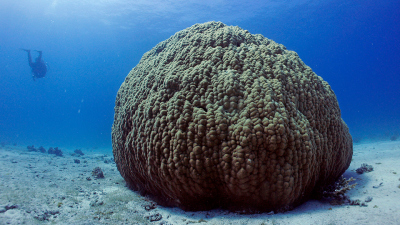- Home
- Discover
- Archive News
- News 2023
- CoralHydro2k
New coral database for climate data of the past 2,000 years
So-called shallow-water corals are widespread in the tropics. Evidence of past environmental conditions can be found in their calcium carbonate skeletons. Climate reconstructions based on corals primarily use the stable oxygen isotope composition, which serves as a proxy for sea surface temperature and hydrology, but also increasingly the strontium/calcium ratio, another proxy for temperature. "The new database is machine-readable, standardized and actively curated," explains co-initiator Dr. Thomas Felis of MARUM – Center for Marine Environmental Sciences at the University of Bremen.
The group of international authors, including Dr. Jessica Hargreaves of MARUM as well as Dr. Thomas Felis, have been meeting regularly for more than five years. Through virtual conversations and meetings – especially during the Covid pandemic – the group has become increasingly well connected. The result is the CoralHydro2k database. It includes peer-reviewed publications and, most importantly, datasets of coral-based climate records from the past 2,000 years. According to the author team, this time span is particularly important to illustrate and understand human-induced climate change of the last about 150 years with profound effects on societies, economies, and ecosystems against the background of the natural climate variability of the pre-industrial era. Understanding past regional trends are so important. "These coral datasets," the publication on the database states, "combined with climate simulations, will be instrumental in improving our understanding of Common Era climate variability and its dynamics."
Tropical coral data can be combined with other high-resolution climate archives, such as tree rings, speleothems or ice cores, for comprehensive climate reconstructions to examine past and present ocean-atmosphere-land interactions. In particular, the new CoralHydro2k database thus allows global comparisons of paleoclimate reconstructions from different archives.
“In the light of the anthropogenic climate crisis, improving our knowledge about the global hydrological cycle is crucial as water is essential for life on our planet. The new Coralhydro2k database is a valuable resource for the community and will undoubtedly stimulate new and relevant research”, says Dr. Lukas Jonkers from MARUM, one of the coordinators of the 2k Network and a member of the PAGES Steering Committee. “The database is another example among a long list of PAGES-2k data products, of collectively increasing the value of paleodata through synthesis. Congratulations team Coralhydro2k!”
Contact:
Dr. Thomas Felis
Coral Paleoclimatology
Phone: 0421 218-65751
E-Mail: [Bitte aktivieren Sie Javascript]
Rachel M. Walter, Hussein R. Sayani, Thomas Felis, et al., and the PAGES CoralHydro2k Project Members: The CoralHydro2k database: a global, actively curated compilation of coral δ18O and Sr ∕ Ca proxy records of tropical ocean hydrology and temperature for the Common Era. Earth Syst. Sci. Data, 15, 2081–2116, https://doi.org/10.5194/essd-15-2081-2023, 2023.
More Information:



